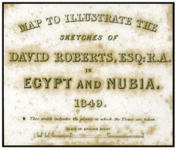INTERVIEW WITH MEHEMET ALI IN HIS PALACE AT ALEXANDRIA
THIS subject appropriately illustrates modern Egypt, since it represents a scene in which Mr. Roberts was introduced to Mehemet Ali, one of the most remarkable men of our day and of history. From a low condition in life, he attained an elevation which in more civilised society would have been hopeless- to the government of Egypt. Cunning, acuteness, resolution, and perseverance, were his qualities. His means of employing them shock our morality, but they were admired and applauded in the East as deeply political. National judgments differ widely when applied to the consideration of great acts. The policy which extirpated the most infamous government that ever disgraces even the East, and held out the hope of such an improved condition of society there as may one day place Egypt among those civilised nations on which free men are governed by laws and institutions for the benefit of the common weal, deserves to be considered well before it is condemned; but if this be doubted, no one will deny the wisdom and virtue of the Pasha's conduct, when, after the countries he had conquered had been wrested from him, and his fleet and army were destroyed in Syria, he might have revenged himself upon the British passengers to India and merchants in Alexandria. No interruption, however, to our intercourse by the Overland route was offered by him; and when our Consul at Alexandria, who feared the Pasha's retaliation, had taken refuge on board of his ships, Mehemet Ali called the merchants before him and said, "Your Consul and representative has deserted you; you are helpless, and at my mercy; but consider me your Consul and protector. Your life and property are safe whilst in my keeping." He afterwards became reconciled tot his disasters when when the influence of the British Government obtained from the Porte, for him and to his heirs in perpetuity, the government of the Land of the Pharaohs.
"Whilst in Alexandria, May 12, 1839," says Mr. Roberts, "I received from Colonel Campbell an invitation to breakfast and afterwards to accompany him tot an interview with the Pasha, which had been arranged for that day. Our party started for the Arsenal, where Mehemet Ali was ready to receive us. After passing through numerous guards we were ushered into the presence-chamber, which, from the window, commanded a magnificent view of the harbour. The fleet, consisting of about twenty sail of the line fully equipped, the Arsenal, the dockyards, and numerous batteries-displaying a power created by his own forethought and energies- lay before us, a glorious scene. The room was spacious and lofty, and crowded with officers in rich uniforms, many of them wearing the decorations. The Pasha was in simple costume, without any mark of distinction upon him which Nature had not stamped, and which was acknowledged by the respect paid to him by all present. His reception of Colonel Campbell seemed to be most cordial, and as unpretending as the reception of an old friend. Having received us and taken his seat on the divan, he beckoned his visitors to be seated. Coffee was then served to us by attendants in rich costumes. The Pasha alone smoked. Only officers of the very highest rank are invited to this enjoyment in his presence."
The scene represents the Pasha seated, whilst Colonel (now General) Patrick Campbell explained to him the proposed route across the Desert. Artem Bey interpreted to His Highness in Turkish the conversation, which was carried on in Italian. There were present, Bogos Bey, his oldest friend and first minister; The Pasha's grandson, Abbas Pasha, the present Viceroy of Egypt. Linant Bey, the French engineer, and others. Among those with Colonel Campbell were Lieutenant Waghorn, the projector of the Overland route tot India, and who has since been so indefatigable in its accomplishment; Mr. Tatum, the distinguished Coptic scholar; Mr. Roberts; Mr. Pell, and other English gentlemen. The interview was partly to congratulate His Highness on his recent safe return from Upper Egypt, and partly in connexion with the projected plans for improving the transit of passengers and merchandise across the Ishtmus of Suez.


